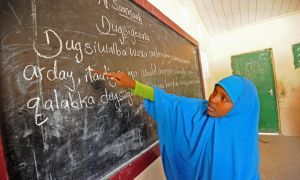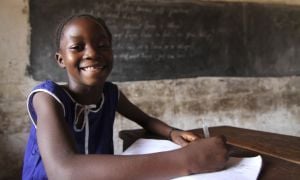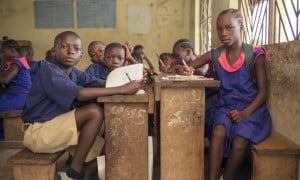
Read our 2024 annual report

Knowledge Hub
Syria Education in Emergencies Evaluation 2020
This evaluation assessed the programme’s contribution to improving the quality of education and learning outcomes for primary school children in Northern Syria. Specifically the evaluation assessed the degree to which the programme has achieved its intended outcomes by looking at programme relevance, appropriateness, efficiency, effectiveness, coverage, impact, connectedness and coherence.
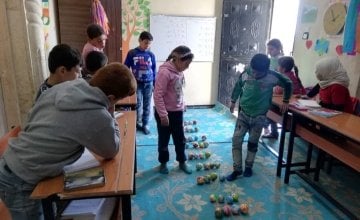
Education in Emergencies
Concern implemented an ECHO funded Education in Emergencies programme in Northern Syria from September 2018 - March 2020. This programme focused on ensuring access to quality education in a safe learning environment for children affected by the crisis in Syria through support to both formal and non-formal education (NFE) services. The programme had a focus on ensuring that out of school children were appropriately targeted and prepared for the transition to safe formal education.
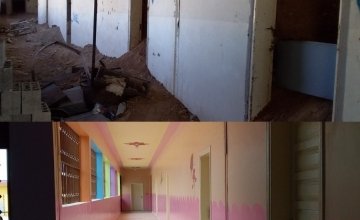
Specific Objectives:
- To improve access of out-of-school and conflict-affected children to quality primary level education with a focus on the provision of safe and inclusive learning environments.
- Girls and boys affected by crisis in Northern Syria have increased access to quality education in safe learning environments.
- Girls and boys affected by crisis in Northern Syria have increased protection and access to appropriate service providers according to their needs.
The formal component included the rehabilitation of 15 formal schools to ensure safe learning environments that met the Inter-Agency Network for Education in Emergencies (INEE), Child Protection and SPHERE minimum standards and the training of teachers within these schools in core components of the Teacher in Crisis Context (TiCC) training modules. After modification, the programme aimed to target a total of 10,500 children and 360 teachers in formal schools.
The NFE component included the establishment of 3 centres which targeted caregivers and a total of 720 children in two distinct groups of learners with the Safe Healing Learning Space methodology focused on Literacy, Numeracy and Social Emotional Learning skills:
- Children from 8 to 10 years old who were out of school and had never attended school to integrate into grade 2 or 3 of formal education with limited age difference with their peers over a 9 month period.
- Children from 8 to 12 who had already attended school but had been out of school for more than a year to give them confidence to go back to school and to help them catch up for the years they missed over a 3 month period before the next school year.
In addition, the programme increased knowledge and capacity related to high quality Education in Emergencies (EiE) interventions through Knowledge Sharing Workshops. The programme also included the adaptation of technical resources for the continuous professional development of EiE facilitators and actors. Finally, the programme also conducted service mapping to identify additional specialised service providers for child protection referrals and to engage with the referral and counter-referral pathways.
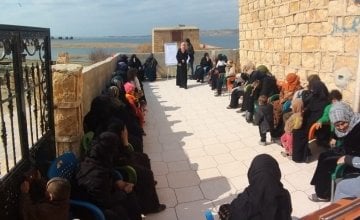
Evaluation findings
The quality and ambition of what was undertaken within this first holistic Education in Emergencies programme in Northern Syria is very significant and considerable lessons can be learned for Concern, donors and partners. The programme was carefully designed with the intention of being a comprehensive approach to ensuring access to quality education within a complex context.
Through the Non-Formal Education programme, managed by Concern, which prepared children both academically (literacy and numeracy skills) as well as socially and emotionally (psychosocial support), over 600 children completed the course and close to 80 percent re-enrolled into formal schools. Formal school programming increased access to education for over 10,000 children by the rehabilitation of schools to ensure safety of children and inclusivity of gender and disability. This was complimented with trainings focusing on pedagogy methods to identify children with protection issues as well as classroom structure and teaching and learning materials for teachers and pupils alike. The results related to learning outcomes and improved access to safe learning environments were found by the evaluation to be exceptional and the overall impact of the programme outstanding.
Key lessons learned
- Comprehensive and holistic Education programming is necessary in the region and Education in Emergencies programming that supports access, quality and wellbeing within both Non-Formal and Formal Education can have significant positive impact on children and communities.
- Continued professional development related to differentiation and the engagement of caregivers in the learning and development of their children is vital for children of all abilities to meet their potential.
- Engaging with the various stakeholders in a previously under-represented and sensitive sector such as Education is valuable and necessary but requires significant investment of time and human resources and necessitates flexibility and adaptability.
- Continuity and substantive leadership in the Education Working Group is required to ensure a comprehensive strategic approach to coordination, with representation of all geographic areas prioritised to ensure strategies are inclusive and reflective of the broader needs of the context.
- The changing, volatile and challenging context of Northern Syria requires an adaptive approach to programming and systems with clear and consistent communication required to allow all team members to effectively engage in their roles.

Development Assistance Committee (DAC) Evaluation Scoring
-
4 - Outstanding: outstanding performance (above expectations)
-
3 - Satisfactory: performance in line with what would be expected of a well-functioning organisation (in line with expectations)
-
2 - Acceptable: generally acceptable performance but with some clear, and documented, shortcomings
-
1 - Minimal: barely acceptable performance with some major shortcomings and reservations
-
0 - Unacceptable: totally unacceptable performance or insufficient data to make an assessment
This page covers humanitarian aid activities implemented with the financial assistance of the European Union, the European Civil Protection and Humanitarian Aid Operations Department (ECHO). The views expressed herein should not be taken, in any way, to reflect the official opinion of the European Union, and the European Commission is not responsible for any use that may be made of the information it contains.


